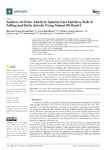Mostrar o rexistro simple do ítem
Analysis of older adults in spanish care facilities, risk of falling and daily activity using Xiaomi Mi Band 2
| dc.contributor.author | Miranda-Duro, María del Carmen | |
| dc.contributor.author | Nieto-Riveiro, Laura | |
| dc.contributor.author | Concheiro-Moscoso, Patricia | |
| dc.contributor.author | Groba, Betania | |
| dc.contributor.author | Pousada, Thais | |
| dc.contributor.author | Canosa, Nereida | |
| dc.contributor.author | Pereira-Loureiro, Javier | |
| dc.date.accessioned | 2021-05-21T09:01:04Z | |
| dc.date.available | 2021-05-21T09:01:04Z | |
| dc.date.issued | 2021-05-11 | |
| dc.identifier.citation | Miranda-Duro MDC, Nieto-Riveiro L, Concheiro-Moscoso P, Groba B, Pousada T, Canosa N, Pereira J. Analysis of older adults in spanish care facilities, risk of falling and daily activity using Xiaomi Mi Band 2. Sensors (Basel). 2021 May 11;21(10):3341. | es_ES |
| dc.identifier.issn | 1424-8220 | |
| dc.identifier.uri | http://hdl.handle.net/2183/27966 | |
| dc.description.abstract | [Abstract] Background: Presently the use of technological devices such as wearable devices has emerged. Physical activity monitoring with wearable sensors is an easy and non-intrusive approach to encourage preventive care for older adults. It may be useful to follow a continuous assessment of the risk of falling. The objective is to explore the relationship between the daily activity measured by Xiaomi Mi Band 2 and the risk of falling of older adults residing in or attending care facilities. Methods: A cross-sectional study was conducted on three different institutions located in Galicia (autonomous community) (Spain). Results: A total of 31 older adults were included in the study, with a mean age of 84 ± 8.71 years old. The main findings obtained were that a greater number of steps and distance could be related to a lower probability of falling, of dependency in basic activities of daily living, or of mobility problems. Conclusions: The importance of focusing on daily steps, intrinsically related to the objective assessment of daily physical activity, is that it is a modifiable factor that impacts different aspects of health and quality of life. | es_ES |
| dc.description.sponsorship | Xunta de Galicia; IN852A 2016/10 | es_ES |
| dc.description.sponsorship | GERIA-TIC project co-funded by the Galician Innovation Agency (GAIN) through the Connect P.E.M.E. Program (third edition) (IN852A 2016/10) and European Union F.E.D.E.R. funds. | |
| dc.language.iso | eng | es_ES |
| dc.publisher | MDPI | es_ES |
| dc.relation | info:eu-repo/grantAgreement/Xunta de Galicia/2016/IN852A 2016%10/ES-GA | |
| dc.relation.uri | https://doi.org/10.3390/s21103341 | es_ES |
| dc.rights | Creative Commons Attribution 4.0 International License (CC-BY 4.0) | es_ES |
| dc.rights.uri | http://creativecommons.org/licenses/by/4.0/ | * |
| dc.subject | Daily steps | es_ES |
| dc.subject | Falls | es_ES |
| dc.subject | Health-related quality of life | es_ES |
| dc.subject | Nursing home | es_ES |
| dc.subject | Occupational therapy | es_ES |
| dc.subject | Physical activity | es_ES |
| dc.subject | Remote monitoring | es_ES |
| dc.subject | Sleep | es_ES |
| dc.subject | Wearable technology | es_ES |
| dc.subject | Wristband | es_ES |
| dc.title | Analysis of older adults in spanish care facilities, risk of falling and daily activity using Xiaomi Mi Band 2 | es_ES |
| dc.type | info:eu-repo/semantics/article | es_ES |
| dc.rights.access | info:eu-repo/semantics/openAccess | es_ES |
| UDC.journalTitle | Sensors | es_ES |
| UDC.volume | 21 | es_ES |
| UDC.issue | 10 | es_ES |
| UDC.startPage | 3341 | es_ES |
| dc.identifier.doi | 10.3390/s21103341 |






